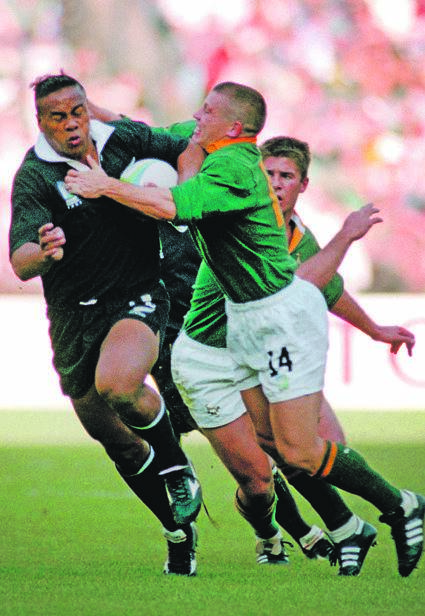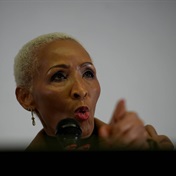
Christchurch, 1996. The New Zealanders are still smarting after their loss to South Africa in the previous year’s historic World Cup final.
National anthems sung, the haka begins and all around the stadium, the crowd erupts for the chorus: “KAmate KAmate.”
The noise is overwhelming, but the “puhuruhuru” gets quieter with every U. And then the crowd is on their feet, alternatively dumbfounded and silent or furious and loud, almost forgetting the All Blacks on the field.
James Small, beating his chest, is walking towards Jonah Lomu and screaming “Come here! Come here! Come here!”
He’s so loud that I can hear him in the press box. It was the first time they had faced each other since the 1995 final, when Small had to contain Lomu, New Zealand’s deadly wing.
It was something no other team managed to do. Lomu didn’t only fail to score a try against the Boks on that day – he never would.
Small himself was dropped after the next test, one in which he played exceptionally at fullback against the All Blacks at Newlands Rugby Stadium in Cape Town, because he had been out partying until the early hours that Saturday morning.
It was all part of his personality and part of the reason that South African rugby supporters loved him so much.
He was the first real rock ’n roll rugby player; long before tattoos and motorcycles became popular, and he had a heart and mind that angels and devils always fought over.
The angels won more than they lost, and then Small was one of the most fun people you could ever dream of meeting.
Without the obstinate devils, he would not have become one of rugby’s biggest heroes.
Small was an excellent player, but less disciplined and gifted than Ruben Kruger and Joost van der Westhuizen, his 1995 team-mates who have already passed on.
But the fact that his name is mentioned in the same breath as them has everything to do with his untamable fighting spirit.
Let’s also thank the angels for that sharp rugby brain.
I have scores of personal memories, some of them involving us exchanging a quick “fo*kof” when he landed in the centre of another media circus, which invariably sparked his latent phobia of journalists.
But most of them are wonderful. If you spend weeks living in a hotel room with a few dozen men every year, the world quickly becomes claustrophobic and the last thing you want to hear is: What do you guys think about Saturday?
For a few months, interrupted by years of our lives, we called each other friends.
He also loved interesting, obscure books and music.
And, unlike many of his team-mates, he was a curious tourist and delved into local cultures – including the parties – everywhere he went.
As professionalism drained more and more of the soul out of rugby, coaches became more wary of him near the end of his career, even as the modern tendency of identikit rugby became ever more popular.
But he was a team man to his very core who loved his team-mates as much as they loved him.
At the beginning of his test career, Danie Gerber once consoled Small after a mistake, something he would do for Percy Montgomery years later.
Before Small’s final test at Murrayfield Stadium in Edinburgh in 1997, Montgomery promised he would score two tries for Small, thereby breaking the Bok try-scoring record.
Monty, at his best, managed to do just that. And, in so doing, the circle was complete – it was Gerber’s record that he broke.
Later that night, I drank two beers with him to celebrate. We stood at the counter in the packed hotel bar and spoke about albums and books, and made futile plans to meet up in Cape Town.
At some point, I realised the eyes of the three dozen-odd women in the bar were all focused about half a metre to the left of my head – they were fixed on Small.
Talk about rock ’n roll – the now forgotten saying preached that men should want to be the rock singer. Well, that wasn’t the only time in my life that I had wished that I was James Small.
The second last time I saw him, he came running up from somewhere behind us in the city to meet my mother.
“I’ve always said to everyone that he’s a good boy!” she said after 10 minutes.
The last time I saw him, he said
I thought we would just laugh about it at the next party.
The 1990s was a decade of so much hope, it’s no wonder that we get nostalgic about it during these nasty times.
Small was one of the faces of our optimism. His life was often messy, and often ecstatic. He achieved and stuffed up in great measure, and was every South African’s naughty kid brother in those days.
And nobody was ever more proud to represent the whole of South Africa than that rebel from Greenside High School in Johannesburg.
We miss him already.




 Publications
Publications
 Partners
Partners








